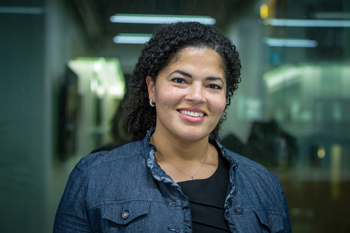Q&A with Dr. Linda Maxwell

By Geoff Koehler

Dr. Linda Maxwell, executive director of the Biomedical Zone (Photo courtesy of Biomedical Zone)
Dr. Linda Maxwell is executive director of the Biomedical Zone — an incubator for health-care technology formed by a partnership between Ryerson University and St. Michael’s Hospital. The Women’s Executive Network recently named her one of Canada’s 100 Most Powerful Women.
Q. What is the Biomedical Zone?
The Biomedical Zone is best known as an incubator for health-care startups. We currently house 13 companies and are working with our parent institutions (St. Michael’s and Ryerson) and external networks to help our companies continually refine their products and bring their innovations to market. We’re more than a traditional incubator, though; we’re an innovation engine for commercialization and entrepreneurship.
Q. Okay, I’ll bite. What is an innovation engine?
Think about wind turbines. Wind is everywhere but you need to place the turbine in the right place and build it a certain way before it can convert wind into energy. As part of both Ryerson and St. Michael’s, we’re tied to two institutions that are full of people with creativity, ingenuity and passion for making things better. The Biomedical Zone is an outlet for those who are passionate enough to take health-care solutions to market. We want be the engine that harnesses big ideas and converts them to innovations that can make lives better for our patients.
Q. What makes for a good Biomedical Zone innovation?
Just because something is new doesn’t mean it’s necessary, or even useful. That’s why we identify startup companies and projects that address an important clinical or patient need — such as Swift Medical’s smartphone app that allows clinicians to track and measure chronic wounds or AceAge’s device to make it easier for patients to remember to take their medication.
Q. Once you have the idea, how does the Biomedical Zone advance it?
Because of our focus on health-care solutions, there is no better place to be than St. Michael’s. The hospital is full of clinicians who have worked with our companies to refine their product to fit the end-user’s needs. Most startups don’t look for clinician input until the product is finalized. We get clinical and commercial together early and frequently. The zone offers a safe, innovation-driven environment with clinical and business development married together.
Q. The Biomedical Zone just celebrated its first birthday. How has the zone grown over the year?
Our engagement with doctors and nurses has grown immensely. We’re continuing to engage with clinicians more and more through measures such as: our Innovation Roundtable, where clinicians hear elevator pitches and demonstrations from companies and provide insights as experts; our Co-Development Lab, which is a program bringing clinicians who have identified a clear challenge to the table with upper-year technology students to develop practical, low-cost solutions; and last month we had our first Demo Night for St. Michael’s, where we showcased some of the Biomedical Zone’s latest health-care innovations and gave staff and physicians a chance to provide feedback and ask questions about tools they or our patients may one day be using.
Q. After a day leading the Biomedical Zone—a bustling place filled with staff, volunteers and more than a dozen companies—how do you unwind?
My trick to unwinding is playing the piano. I practice on different pieces, including classical and modern music. Beethoven and Bacharach are some of my favourites.
About St. Michael’s Hospital
St. Michael’s Hospital provides compassionate care to all who enter its doors. The hospital also provides outstanding medical education to future health care professionals in 27 academic disciplines. Critical care and trauma, heart disease, neurosurgery, diabetes, cancer care, care of the homeless and global health are among the hospital’s recognized areas of expertise. Through the Keenan Research Centre and the Li Ka Shing International Healthcare Education Centre, which make up the Li Ka Shing Knowledge Institute, research and education at St. Michael’s Hospital are recognized and make an impact around the world. Founded in 1892, the hospital is fully affiliated with the University of Toronto.
